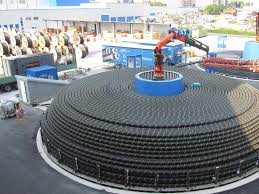The world’s first industrial hydrogen fuel cell system has been installed in a construction site by Siemens Energy and GeoPura. The fuel cell has been designed to provide a low-carbon solution for off-grid power and heat. The system is powering a construction village for the Viking Link interconnector project in Lincolshire, UK, under development by the National Grid and Danish utility operator Energinet. The 1.4 GW high voltage electricity interconnector will be the longest in the world when completed, stretching 765km subsea and onshore connecting from Bicker Fen in Lincolnshire, UK, and Revsing in South Jutland, Denmark to enable clean energy to be shared. The project is expected to be off-grid for 6-8 months. Power and heat produced by the system feed 20 cabins (welfare areas, offices, and meeting spaces), and six electric vehicle charging points on site. It’s initially running on conventional hydrogen sources but the intention is to move to green hydrogen (the form produced from renewables) “once suitable supply has been confirmed,” Siemens said.
Also Read: World’s first solar & hydrogen-powered cabins cut carbon at HS2 construction sites.
The world’s first off-grid hydrogen fuel cell system uses waste heat and includes battery storage to smooth the peaks in power demand and improve efficiency. Should there be a hydrogen supply disruption, the site would have enough power stored to run for a number of hours. Once green hydrogen is used, the only by-product will be water, as opposed to the traditional diesel power generators usually adopted at construction sites that give off carbon fumes and are detrimental to the environment. That’s why ministers and the industry are excited about this project. “This project shows that zero-emission power generation has reached a point where it can viably replace off-grid diesel generation and remove these health risks to the benefit of all,” said Andrew Cunningham, managing director of Pura.
UK energy minister Kwasi Kwarteng added that such projects at the Viking Link site “will be vital in enabling a hydrogen economy to flourish in the UK as we build back better with new low carbon jobs.”

Leave a Reply